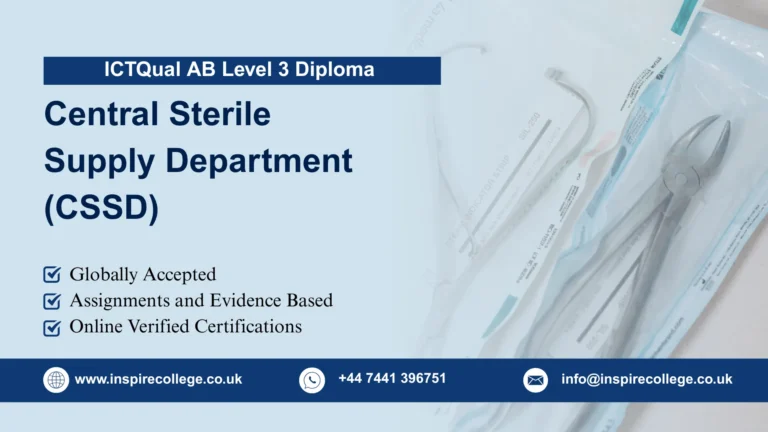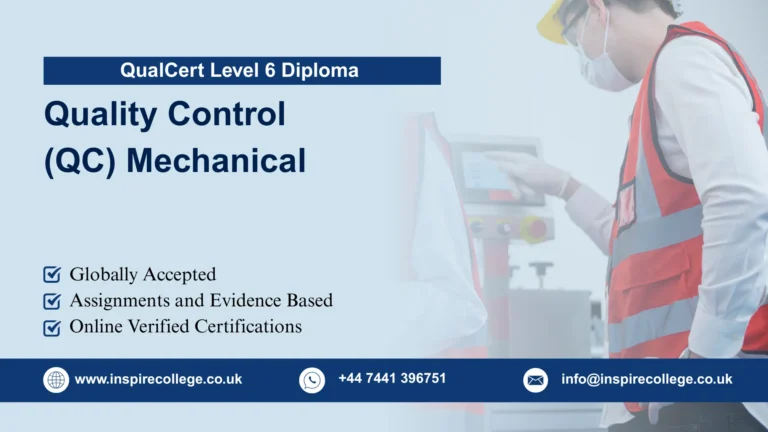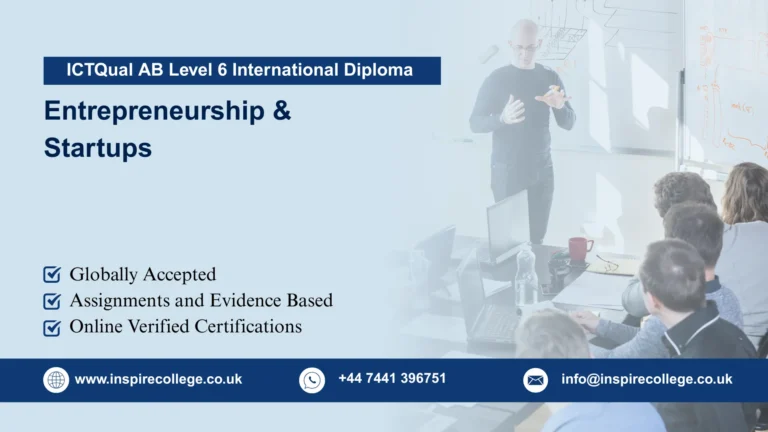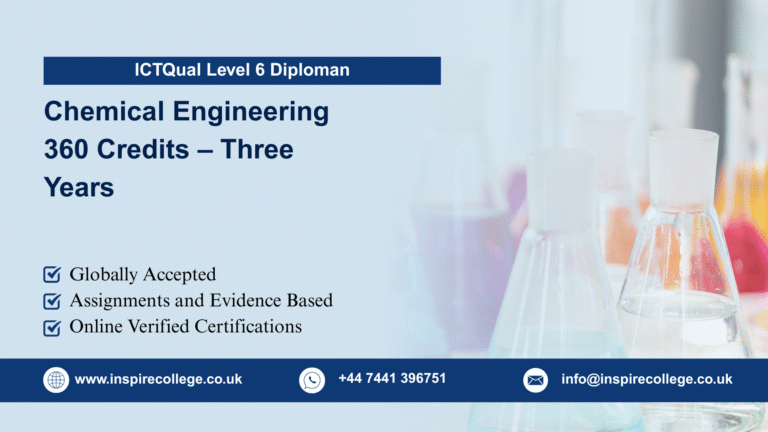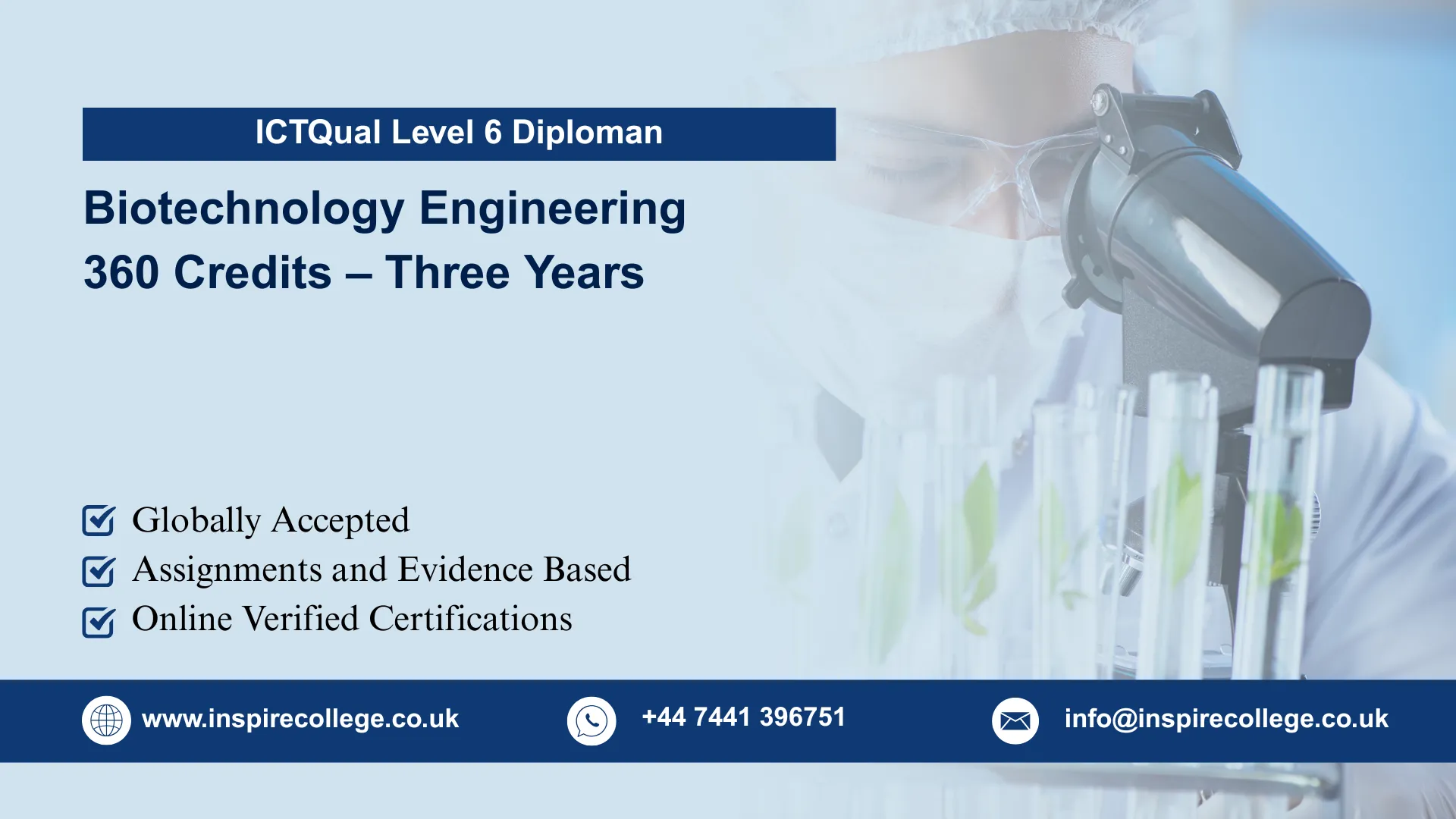
ICTQual Level 6 Diploma in Biotechnology Engineering 360 Credits – Three Years
The ICTQual Level 6 Diploma in Biotechnology Engineering is a comprehensive three-year program designed to equip learners with advanced knowledge and practical skills in biotechnology, bioengineering, and related scientific fields. Biotechnology is at the forefront of innovation, driving advancements in healthcare, agriculture, environmental management, and industrial processes. This course provides learners with the expertise to contribute to cutting-edge research, technology development, and sustainable solutions in diverse industries.
The purpose of ICTQual Level 6 Diploma in Biotechnology Engineering is to develop highly skilled professionals who can integrate biology, chemistry, and engineering principles to solve complex problems. Learners will explore core areas such as molecular biology, genetic engineering, bioprocess technology, bioinformatics, and industrial biotechnology. The curriculum balances theoretical knowledge with hands-on laboratory practice, experimental research, and project-based learning, ensuring students can apply concepts in real-world settings.
Through ICTQual Level 6 Diploma in Biotechnology Engineering , learners will acquire critical analytical and problem-solving skills, mastery of modern laboratory techniques, and proficiency in bioengineering design and bioprocess optimization. The program also emphasizes research methodology, regulatory compliance, and ethical practices in biotechnology, preparing students for professional roles that demand precision, innovation, and responsibility.
Designed for both fresh graduates and professionals, the ICTQual Level 6 Diploma in Biotechnology Engineering enables career advancement in pharmaceuticals, biomedical research, agricultural biotechnology, environmental technology, and industrial bioengineering. Graduates emerge as competent, industry-ready professionals capable of driving innovation and contributing to scientific and technological development on a global scale.
The ICTQual Level 6 Diploma in Biotechnology Engineering is designed for both fresh graduates and professionals seeking advanced knowledge and practical skills in biotechnology and bioengineering. To ensure learners can successfully engage with the program, the following entry requirements apply:
Age Requirements
- Learners must be at least 18 years of age at the time of enrolment.
Educational Requirements
- Applicants should have completed a relevant Level 5 qualification or equivalent in Biotechnology, Biology, Chemistry, Biochemistry, or related scientific fields.
- Candidates with strong STEM backgrounds (Science, Technology, Engineering, Mathematics) will also be considered.
- A related course, such as the ICTQual Level 5 Diploma in Biotechnology or Applied Life Sciences, is recommended for foundational knowledge.
Professional Experience
- Professionals with at least 3–5 years of verifiable experience in biotechnology, laboratory research, pharmaceutical, or industrial bioengineering sectors may be eligible for accelerated assessment or recognition of prior learning.
English Language Proficiency
- Learners whose first language is not English must demonstrate proficiency through recognized tests such as IELTS (minimum 5.5), TOEFL (minimum 65), or equivalent qualifications.
These entry requirements ensure that all learners are well-prepared to benefit from the advanced curriculum, practical laboratory work, and research-focused projects. Meeting these standards allows students to fully engage with the ICTQual Level 6 Diploma in Biotechnology Engineering and successfully progress towards professional competence and career advancement in the global biotechnology industry.
Mandatory Units
This qualification, the ICTQual Level 6 Diploma in Biotechnology Engineering 360 Credits – Three Years, consists of 36 mandatory units.
Year 1: Foundations of Biotechnology Engineering
- Introduction to Biotechnology
- Principles of Molecular Biology
- Basics of Biochemistry
- Fundamentals of Microbiology
- Introduction to Genetics and Genomics
- Principles of Cell Biology
- Mathematics for Biotechnology
- Fundamentals of Biostatistics
- Introduction to Engineering in Biotechnology
- Analytical Techniques in Biotechnology
- Basics of Bioinformatics
- Environmental Science and Sustainability
Year 2: Intermediate Biotechnology Concepts
- Bioprocess Engineering and Design
- Applied Microbiology and Industrial Applications
- Recombinant DNA Technology
- Biomaterials and Nanotechnology
- Immunology and Vaccine Development
- Protein Engineering and Enzyme Technology
- Bioinformatics Tools and Applications
- Environmental Biotechnology and Waste Management
- Bioreactors and Fermentation Technology
- Biomedical Engineering Basics
- Advanced Biostatistics and Data Analysis
- Ethical and Regulatory Aspects of Biotechnology
Year 3: Advanced Topics and Specialization
- Genetic Engineering and Genomic Editing
- Advanced Bioprocess Engineering
- Biotechnology Research Methods
- Pharmaceutical Biotechnology and Drug Development
- Systems Biology and Computational Modeling
- Agricultural Biotechnology and GMOs
- Industrial Biotechnology and Bioeconomy
- Synthetic Biology Applications
- Advanced Environmental Biotechnology
- Innovation and Entrepreneurship in Biotechnology
- Biotechnology Project Management
- Final Year Research Project
The ICTQual Level 6 Diploma in Biotechnology Engineering equips learners with a comprehensive understanding of biotechnology principles, practical laboratory skills, and professional competencies. Graduates develop the ability to integrate biological, chemical, and engineering concepts to solve real-world problems in healthcare, agriculture, environmental management, and industrial biotechnology.
Year 1: Foundations of Biotechnology Engineering
Introduction to Biotechnology
- Understand the scope, applications, and impact of biotechnology across industries.
- Identify key areas of research and development in modern biotechnology.
- Develop foundational knowledge of laboratory practices and safety protocols.
Principles of Molecular Biology
- Explain molecular mechanisms of DNA, RNA, and protein synthesis.
- Apply molecular biology techniques in laboratory experiments.
- Analyze molecular interactions and their relevance to cellular function.
Basics of Biochemistry
- Understand the structure and function of biomolecules.
- Perform basic biochemical assays and analyses.
- Relate biochemical processes to cellular metabolism and biotechnology applications.
Fundamentals of Microbiology
- Describe microbial diversity and its applications in biotechnology.
- Apply aseptic techniques and microbial culture methods in laboratory settings.
- Understand microbial roles in fermentation, bioprocessing, and industrial applications.
Introduction to Genetics and Genomics
- Explain Mendelian genetics and modern genomics principles.
- Analyze genetic variations and their implications for biotechnology.
- Apply basic genomic tools for research and experimental design.
Principles of Cell Biology
- Understand cell structure, function, and signaling pathways.
- Relate cell biology concepts to tissue engineering and regenerative biotechnology.
- Conduct laboratory experiments involving cell culture and observation.
Mathematics for Biotechnology
- Apply mathematical techniques to solve biological and engineering problems.
- Use calculations for data analysis, enzyme kinetics, and modeling experiments.
Fundamentals of Biostatistics
- Collect, analyze, and interpret experimental data.
- Apply statistical methods to ensure reliability and accuracy of research findings.
Introduction to Engineering in Biotechnology
- Integrate engineering principles with biological systems.
- Understand bioprocess design and equipment used in industrial biotechnology.
Analytical Techniques in Biotechnology
- Perform spectroscopic, chromatographic, and molecular assays.
- Interpret analytical data to evaluate biological and chemical samples.
Basics of Bioinformatics
- Use computational tools to analyze DNA, RNA, and protein sequences.
- Apply bioinformatics to predict structural and functional properties of biomolecules.
Environmental Science and Sustainability
- Understand environmental impacts of biotechnology practices.
- Apply sustainable practices and green technologies in laboratory and industrial settings.
Year 2: Intermediate Biotechnology Concepts
Bioprocess Engineering and Design
- Design and optimize bioprocesses for industrial applications.
- Apply principles of mass and energy balance to bioreactors.
- Evaluate process efficiency and scalability.
Applied Microbiology and Industrial Applications
- Use microbial strains for fermentation, biofuel production, and bioremediation.
- Implement quality control and microbial safety protocols.
Recombinant DNA Technology
- Perform genetic cloning and gene expression experiments.
- Analyze recombinant protein production and applications.
Biomaterials and Nanotechnology
- Understand properties and applications of biomaterials.
- Apply nanotechnology principles to drug delivery and tissue engineering.
Immunology and Vaccine Development
- Understand immune system mechanisms and immune responses.
- Apply biotechnology techniques for vaccine design and evaluation.
Protein Engineering and Enzyme Technology
- Analyze protein structure-function relationships.
- Design and optimize enzymes for industrial and biomedical applications.
Bioinformatics Tools and Applications
- Utilize computational software for genomics and proteomics analysis.
- Interpret biological datasets for research and experimental planning.
Environmental Biotechnology and Waste Management
- Apply biotechnology solutions for waste treatment and pollution control.
- Design sustainable processes for industrial and agricultural settings.
Bioreactors and Fermentation Technology
- Operate and optimize laboratory and industrial-scale bioreactors.
- Monitor fermentation processes and product yield.
Biomedical Engineering Basics
- Integrate biotechnology with medical devices and diagnostic systems.
- Understand applications of tissue engineering and regenerative medicine.
Advanced Biostatistics and Data Analysis
- Apply multivariate statistical techniques for experimental evaluation.
- Interpret complex datasets to support research conclusions.
Ethical and Regulatory Aspects of Biotechnology
- Understand ethical issues, regulatory compliance, and biosafety standards.
- Apply best practices for responsible research and industrial applications.
Year 3: Advanced Topics and Specialization
Genetic Engineering and Genomic Editing
- Apply CRISPR and other genome editing technologies.
- Analyze genetic modifications for therapeutic and agricultural applications.
Advanced Bioprocess Engineering
- Design scalable bioprocesses for pharmaceuticals, enzymes, and biofuels.
- Optimize production efficiency using modeling and control techniques.
Biotechnology Research Methods
- Plan and conduct independent research projects.
- Apply scientific methodology, data analysis, and report writing.
Pharmaceutical Biotechnology and Drug Development
- Understand drug design, development, and regulatory processes.
- Apply biotechnological methods for therapeutic protein and vaccine production.
Systems Biology and Computational Modeling
- Integrate omics data for predictive modeling of biological systems.
- Use computational tools to simulate complex biochemical networks.
Agricultural Biotechnology and GMOs
- Apply genetic engineering to crop improvement and pest resistance.
- Understand regulatory and safety considerations for GMOs.
Industrial Biotechnology and Bioeconomy
- Implement biotechnological processes in industrial settings.
- Evaluate economic and environmental sustainability of bio-based products.
Synthetic Biology Applications
- Design synthetic gene circuits and engineered organisms.
- Analyze applications in medicine, agriculture, and industry.
Advanced Environmental Biotechnology
- Apply microbial and molecular tools for environmental remediation.
- Evaluate sustainability of bioprocesses in industrial and ecological systems.
Innovation and Entrepreneurship in Biotechnology
- Develop business plans for biotech startups and research commercialization.
- Understand intellectual property, funding, and regulatory considerations.
Biotechnology Project Management
- Plan, execute, and manage complex biotechnology projects.
- Apply leadership and teamwork skills in research and industrial settings.
Final Year Research Project
- Conduct an independent, research-driven project.
- Integrate theoretical knowledge, laboratory skills, and analytical techniques to solve real-world biotechnology problems.
This structured curriculum ensures learners acquire advanced technical knowledge, laboratory expertise, research capabilities, and professional competencies, preparing them for leadership roles in pharmaceuticals, agriculture, environmental biotechnology, and industrial bioengineering globally.
The ICTQual Level 6 Diploma in Biotechnology Engineering is designed for learners who are motivated to advance their knowledge, skills, and professional competence in biotechnology and bioengineering.
Recent Graduates
- Learners with diplomas or bachelor’s degrees in Biotechnology, Biology, Chemistry, Biochemistry, or related scientific fields seeking advanced specialization.
Working Professionals
- Individuals currently employed in biotechnology, pharmaceuticals, healthcare, agricultural biotech, or environmental biotech aiming to enhance technical and managerial expertise.
Research Enthusiasts
- Learners interested in R&D roles in molecular biology, genetic engineering, bioinformatics, or industrial biotechnology.
Aspiring Leaders and Entrepreneurs
- Individuals aiming to take leadership positions or start biotech ventures, laboratories, or industrial organizations.
Higher Education Seekers
- Students planning to progress to postgraduate studies such as a master’s in Biotechnology, Bioengineering, or related fields.
ICTQual Level 6 Diploma in Biotechnology Engineering equips learners with advanced technical knowledge, practical laboratory skills, and professional competencies to excel in global biotechnology industries, research environments, and innovative entrepreneurial roles.
We are an approved centre of ICTQual AB, and all learners must enrol with us to access the certification pathways for the ICTQual Level 6 Diploma in Biotechnology Engineering.
Route for Experienced Professionals
- Applicants must have a minimum of 6 years of verifiable professional experience in biotechnology, pharmaceuticals, environmental biotech, or related industries.
- Submit a detailed portfolio or evidence of work experience for assessment and recognition of prior learning.
- Complete any gap-bridging modules if recommended by the assessment team.
- Undertake a capstone project or applied research project demonstrating practical expertise.
- Receive mentorship and guidance to align professional experience with diploma learning outcomes.
- Upon successful assessment, learners are awarded the ICTQual Level 6 Diploma in Biotechnology Engineering.
Route for Fresh Candidates
- Enrol as a new learner through our approved ICTQual AB centre.
- Complete all 36 assignments covering theory, laboratory work, and practical applications.
- Participate in guided workshops, research exercises, and project-based learning modules.
- Undertake a final year research project demonstrating applied biotechnology skills.
- Receive continuous assessment and feedback to ensure mastery of course content.
- Upon successful completion, learners are awarded the ICTQual Level 6 Diploma in Biotechnology Engineering.
Both certification routes equip learners with a globally recognized qualification, integrating practical, technical, and managerial skills. Graduates gain expertise in areas such as molecular biology, genetic engineering, bioinformatics, bioprocess design, industrial biotechnology, environmental biotechnology, and entrepreneurship, preparing them for advanced professional roles, research, and leadership positions in the biotechnology sector worldwide.
Register Now
FAQs for ICTQual Level 6 Diploma in Biotechnology Engineering


